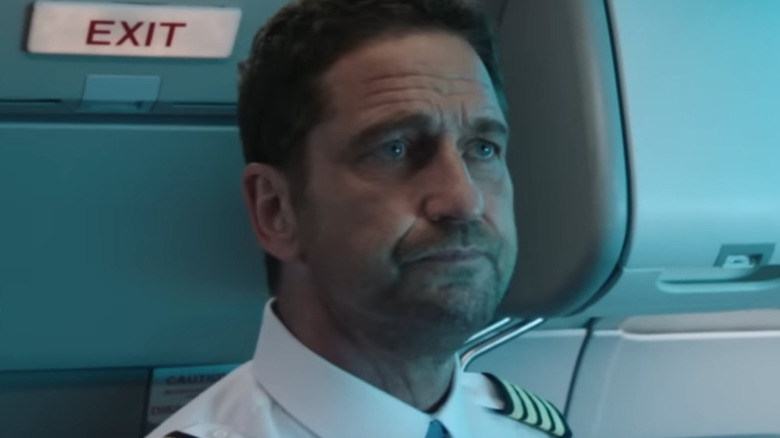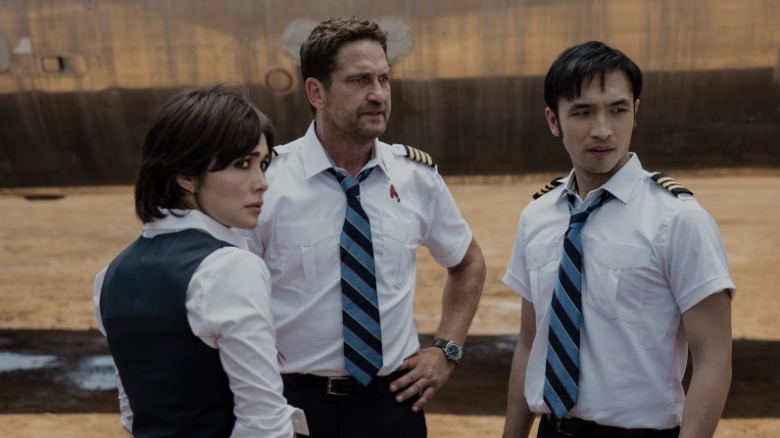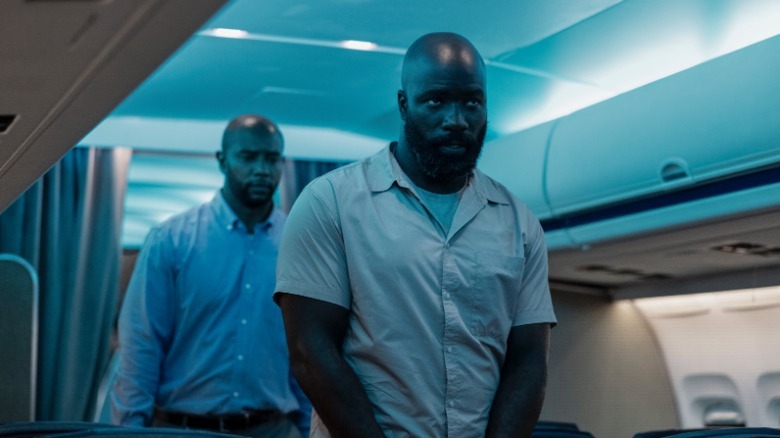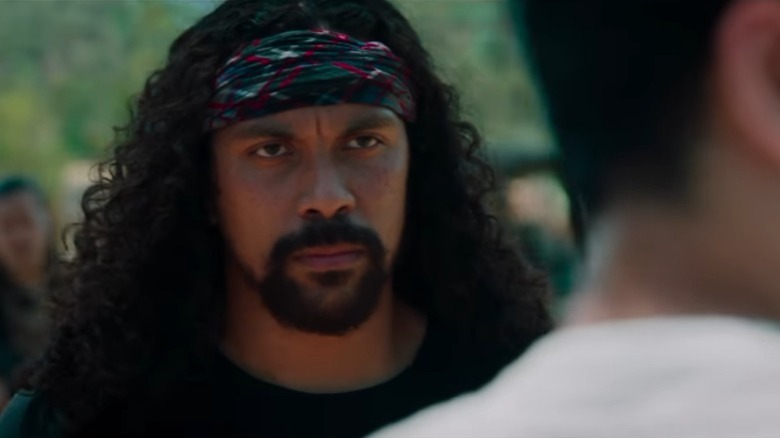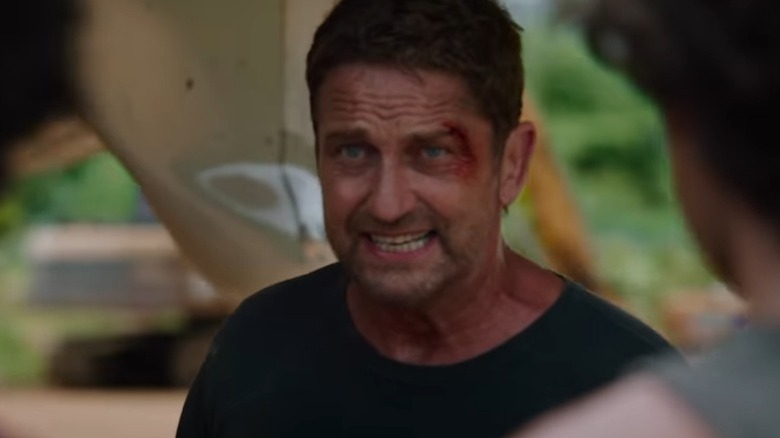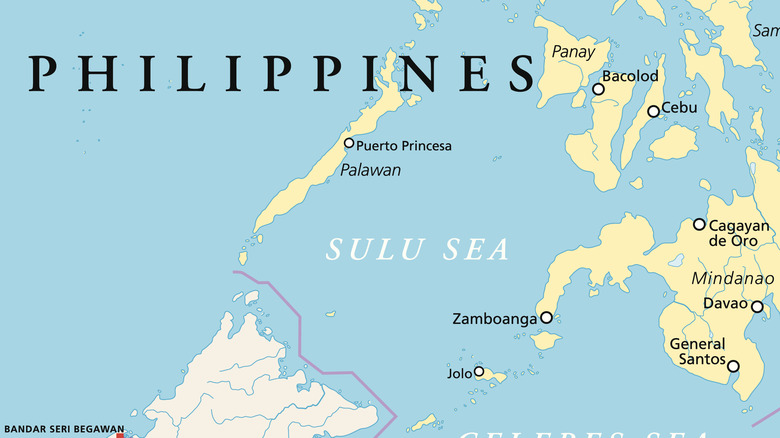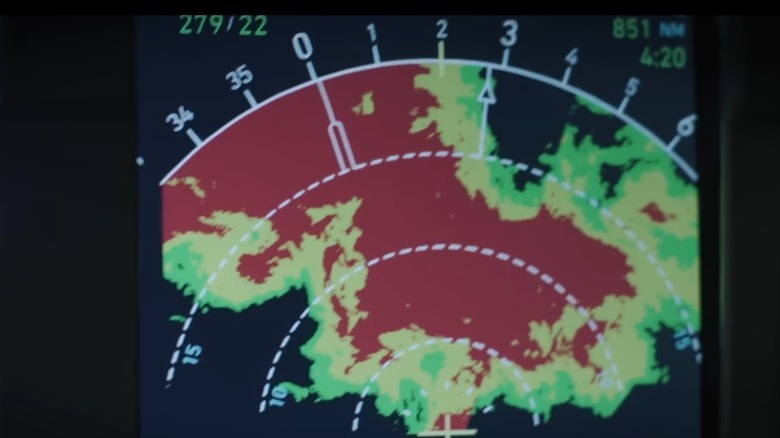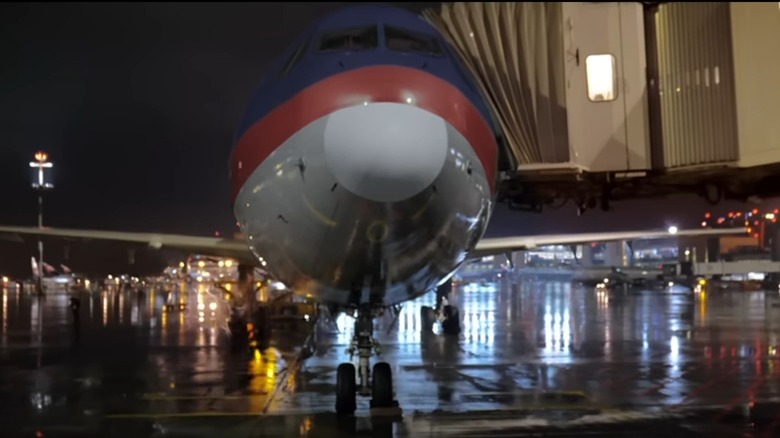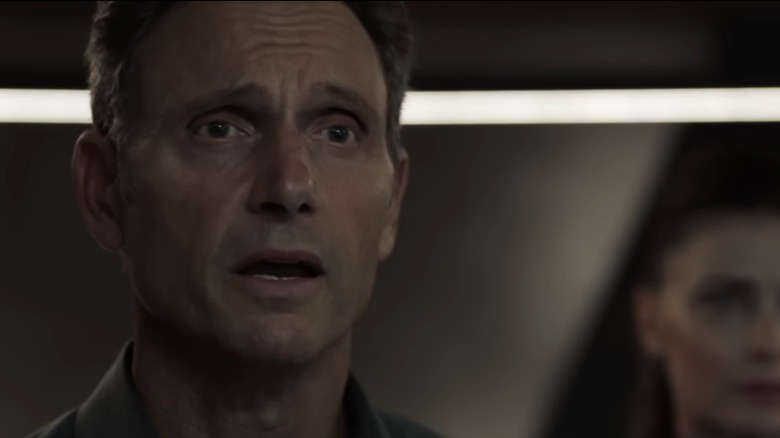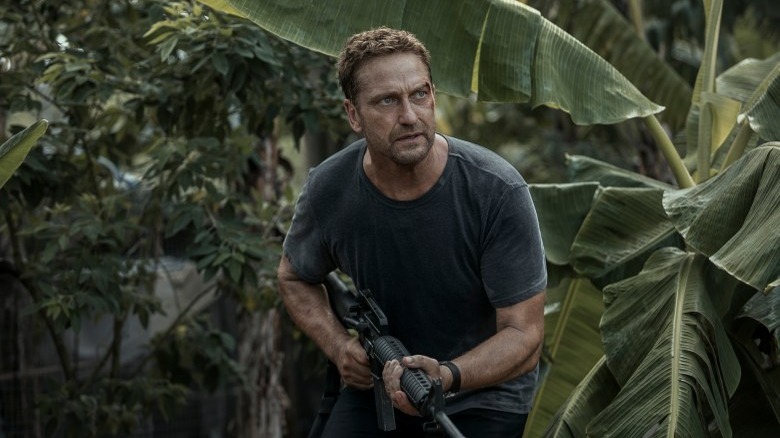The Ending Of Plane Explained
The new Gerard Butler vehicle "Plane" sounds like it aims to join the list of self-aware movies that definitely don't lie in the title, a la "Hobo with a Shotgun" or the similarly-themed "Snakes on a Plane." When the trailer ended with a gloriously straight-ahead one-word title, it would be easy to expect another Gerard Butler action movie that's so bad it's kind of good. But as critics and audiences have discovered, "Plane" is both an entirely sincere, unironic action thriller with none of the silliness the title might imply, and also just straightforwardly pretty good. It's not the most plausible story in the world, but as a cinematic experience, it's a lot closer to the gritty realism of "The Bourne Identity" than it is to Samuel L. Jackson yelling about how tired he is of snakes in the stratosphere.
"Plane" takes its time to get going, with a dread-inducing buildup to the crash that the trailer told us was coming. But when the passengers of Trailblazer 119 are taken hostage in a lawless region of the Philippines, the movie essentially becomes "Die Hard" on an island until the end, with a spectacular and unusually vulnerable performance from Butler as Capt. Brodie Torrance. If you missed some details with your heart in your throat, let's debrief the worst travel experience this side of a Southwest delay. This is the ending of "Plane," explained.
All's well that ends (mostly) well
At the end of "Plane," a few passengers spontaneously clap for Capt. Brodie in an awkward show of gratitude, but nobody really expresses an adequate amount of disbelief at the sheer insanity of what he's just accomplished. Operating on pure adrenaline and with an increasing number of wounds, he's successfully saved the lives of the majority of his passengers. When you consider the circumstances, just four fatalities (two in the crash and two who panicked when they got taken hostage) is a remarkable success.
And while he needed a big assist from mysterious criminal Louis Gaspare (Mike Colter) to get his John McClane on during the hostage portion of the movie, true to the spirit of "Plane" and its title, his real heroism is some piloting more extreme than anything Tom Cruise's Maverick pulls off in "Top Gun." The most thrilling sequences of the movie are the emergency landing with no avionics and a battery about to die after the lightning strike, and an improbable takeoff at the end to get away from an angry Filipino militia. Like he tells his co-pilot Dele (Yoson An), the only way Brodie got through it all was by taking it "one minute at a time."
Gaspare gets away
We never quite learn the circumstances surrounding the homicide charge that Louis Gaspare has been running from. We know that he's a late addition to Flight 119, accompanied by a member of the Royal Canadian Mounted Police, so he's being extradited back to Canada. He refuses to tell Brodie anything more than that he was in "the wrong place at the wrong time": Presumably, he is implying that he's innocent, but with the weary cynicism of a man who's spent the last 15 years of his life as a fugitive.
All we have to judge Gaspare by are his actions in "Plane," which are selflessly heroic. After Brodie removes his handcuffs, Gaspare disappears into the jungle but chooses to return and help the captain fight off the first few mercenaries they encounter, and puts his time in the French Foreign Legion to good use as they cut their way through an entire militia and rescue the passengers. In the end, he escapes into the wilderness with the Black Ops Team's "emergency fund" of half a million dollars and a nod of respect from Brodie. It won't be easy for him to make it out of the Jolo islands alive, but he's certainly tough enough to pull it off.
Junmar gets what's coming to him
On the whole, "Plane" and director Jean-François Richet are more interested in keeping the tension high than in developing characters, which means we barely get to know our main bad guy, Junmar (Evan Dane Taylor). He's obviously a brutal leader of his loose band of separatists: We see evidence of earlier hostage beheadings, and Junmar ruthlessly kills a woman attempting to flee when they capture the Trailblazer passengers, as well as her distraught husband. When Brodie attempts to trade himself for the rest of the hostages, "Captain Phillips" style, he finally comes face to face with Junmar. Despite a language barrier, the enmity between the two is palpable, as Junmar has his underling deliver a serious beating to the noble Scottish captain.
It's just enough to set up the climactic moment of the movie, and it's one of the few moments when "Plane" combines thrilling action with the kind of over-the-top moment a much sillier film would have way too many of. As Brodie and the passengers make a desperate final attempt to get the plane back in the air and escape, Junmar is the last enemy with a chance to take the plane down, frantically trying to load a rocket launcher directly in the plane's path. But he's too late: In a rousing crash, the front wheel of the landing gear wipes Junmar out, presumably for good, and Trailblazer 119 is able to limp to safety. Satisfyingly, Brodie gets to make brief eye contact with Junmar before he wins the day.
An emotional decompression
One of the more memorable and unique parts of "Plane" is the extended sigh of relief when Trailblazer 119 lands on a safe island, with rescue workers and authorities on the runway. Instead of cutting to the future and showing Brodie and his daughter living happily ever after, "Plane" lingers on the last moments that Brodie, his passengers, and his flight crew all spend together. The emotions and trauma of what they've all been through are clearly right there under the surface, and it's borderline tear-jerking when head flight attendant Bonnie (Daniella Pineda) thanks Brodie for saving her life and Dele tells him "it's been an honor."
It goes on so long that it's actually helpful when someone double-checks with Brodie that he does intend to get medical treatment and not sit on the plane forever. But it's a very welcome bit of decompression time. Combined with the patient and realistic way that "Plane" emphasizes the preflight checks and takeoff procedure at the beginning of the movie in Singapore, it makes the whole movie feel as close to experiencing all of the action in real-time with the characters as it possibly can.
The real Jolo islands
Unlike "Top Gun: Maverick," which just doesn't bother to identify its antagonistic nation that's developing a nuclear program, "Plane" picks a real island in a real country as its setting: Jolo island in the Sulu province of the Philippines. Jolo is in fact home to the Abu Sayyaf group, an Islamic militant separatist group that's essentially been at war with the Filipino government for three decades. They have been responsible for multiple kidnappings: As far back as 2000, 21 people were abducted from a Malaysian diving resort and taken back to Jolo; Abu Sayyaf then took to kidnapping the journalists that showed up to cover that kidnapping.
That said, the idea that the Philippine military "won't even go there" is a bit hyperbolic: According to Benar News, some 195 Abu Sayyaf militants have surrendered to military forces within the last two years on Jolo Island, and the membership of the group has been diminishing for years. "Plane" depicts its relatively anonymous militants without getting into their ideology or motivation; it's enough that they're hostage-taking opportunists. There's a reason the movie's called "Plane" and not "Nuanced Examination of Islamic Extremism."
Flight 119 versus lightning
Presumably part of the fallout of the events of "Plane" will be an investigation into why Trailblazer Flight 119 was done in so easily by a lightning strike. That might sound suitably disastrous to the majority of audiences — aka those of us not in the aviation industry — but it's actually a pretty common occurrence. According to the National Weather Service, "Commercial transport passenger planes are hit by lightning an average of one or two times a year. They are designed and built to have conducting paths through the plane to take the lightning strike and conduct the currents." To be clear, that means more or less every plane the size and class of the "Plane" plane is hit by lightning once or twice annually.
Looking into the history of lightning strikes, Scientific American reported that the last flight to crash from lightning in the U.S. was way back in 1967. So ultimately the inciting incident in "Plane" is the one that requires the most suspension of disbelief: It's extremely unlikely that a lightning strike would so severely disable Trailblazer 119. If it did, somehow getting through the specially designed aluminum hull and lighting diverter strips and other failsafe, then it's yet an even bigger stretch to believe that the aircraft would be able to take off again within hours of such a disaster. "Plane" could be re-titled "The Giant Plane That Could"; given the science, 119 is the most heroic inanimate object since the famous carbon rod from one of the best episodes of "The Simpsons," "Deep Space Homer."
Chekhov's starboard fuel reserves
It's actually kind of a pity that the trailer for "Plane" spoils the fact that Trailblazer 119 takes off again late in the movie, because it's a genuinely well-paced plot twist that pays off a source of unbearable tension during the emergency landing. After minutes of gripping tension as they descend without avionics, with a battery that's about to run out, Brodie and Dele prepare to make impact on Jolo island. To avoid turning the giant plane into a deathly fireball, they jettison the fuel reserves, but the right-side fuel ejection system has been damaged by the lightning strike. It ratchets up the tension, knowing that if the landing gear doesn't hold the plane could easily explode as they manage to stop on a dirt road.
From there, it's easy to assume that the rest of "Plane" will consist of waiting for rescue while fending off the hostile separatists on the island. But the fact that the plane still has fuel — plus however Dele miraculously gets some of its systems working again — is what allows Brodie to attempt an improbable take off from Jolo and get away from an entire army of angry, kidnap-happy locals. Even when the plane is grounded, based on the landing sequence, you kind of expect it to explode at any moment. But the fuel reserves become the passengers' salvation instead.
Airline crisis management
Other than an indelible delivery of "I like this guy" when he sees Brodie's violent past, Tony Goldwyn's crisis management character Scarsdale doesn't add as much to "Plane" as he should. Summoned in the middle of the night and presented to us as some sort of übercompetent fixer like Harvey Keitel's The Wolf in "Pulp Fiction," Scarsdale's primary usefulness turns out to just be hiring the black ops team that manages to arrive just in time to save Brodie from the separatists and provide key cover as the passengers make their escape. He also encourages Brodie to attempt the dangerous takeoff, overruling the owner of Trailblazer (Paul Ben-Victor), who for PR reasons apparently just wants everyone to get gunned down on Jolo island instead.
Scarsdale's character feels kind of as if he wandered in from another movie, and leaves us with a strangely contradictory impression of Trailblazer Airlines. They're apparently as penny-pinching and reliant on old technology as Southwest or any other large operator: 119 is described as an outdated craft even by its passengers, and a low-level stooge is responsible for the decision to fly through the storm to save fuel costs. But they also have a former special-ops fixer on the payroll, as well as an entire field team that can parachute lawlessly into the Philippines and casually leave behind half a million dollars.
Brodie's future
Although we get to see Brodie call his daughter in the last shot of "Plane," we're left to speculate for ourselves what the fallout will be for his life and career. After a video showing him putting a passenger in a chokehold went viral before the events of the movie, he's been banished to a crummy assignment in Singapore, far away from his family in the States — although since the passenger was unruly and punching other people, it seems like that video would make him popular, as opposed to a pariah.
What's Trailblazer's policy on pilots that kill several people, albeit in justifiable self-defense while protecting their passengers? The events of "Plane" would be an insane circus of media coverage if they happened in real life. Hopefully, on the strength of his "Rambo"-like heroics and two emergency landings, Brodie can retire and live a life of giving interviews about being way more of a hero than "Sully" Sullenberger could ever dream of. With luck, he can make it home for New Year's Eve next year without fighting for his or anyone else's life.
